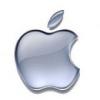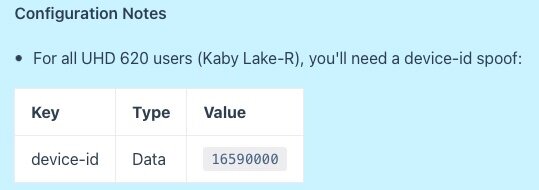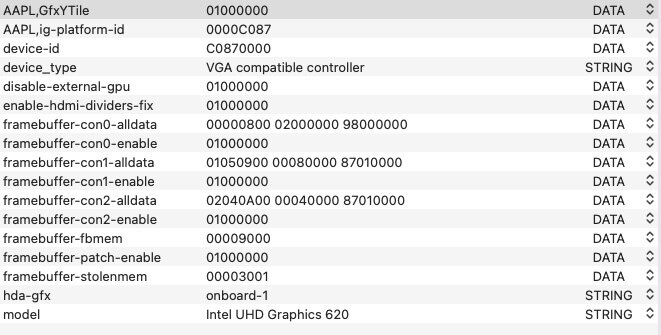-
Posts
10069 -
Joined
-
Last visited
-
Days Won
569
Content Type
Profiles
Articles, News and Tips
Forums
Everything posted by Hervé
-
@juhyh please post your full system's hardware specifications: LAN, Wireless, audio codec, SD card reader, trackPad model, etc. An indication of the boo loader and bootloader version you've used would also be most useful. Add to that a zipped copy of the bootoloader EFI that you currently use. Without these, it's impossible to provide assistance.
-
Open up a new thread for this separate issue.
-

[Solved] Latitude 7280: stuck trying to install Monterey
Hervé replied to cybermac's topic in The Archive
Define "not working". -

[Solved] Latitude 7280: stuck trying to install Monterey
Hervé replied to cybermac's topic in The Archive
You need fully working Wireless + Bluetooth for Airdrop to work. Then set the suitable rights in Airdrop of course. -

[Solved] E6430: unable to boot OC 0.7.9 to install High Sierra
Hervé replied to Viez's topic in The Archive
Webcam is USB based. Can't remember if there are a couple of different models that were fitted to the E6430 like there were on the E6420. As long as your USB ports are properly mapped, Webcam will work either OOB or not at all depending on the model. Look it up in SysInfo->Hardware-USB or in IOReg. In your case of an E6430 with a quad-core CPU, the best SMBIOS to use in my opinion Is MBP10,2 but BMP9,2 will do fine too (not MBP9,1 or MBP10,1 because these used a Kepler nVidia dGPU). Make sure you make your USB port mappings after you've selected your SMBIOS, the 2 are linked. Re: CPU power management, it does not look like you got it right: you sure generated the proper SSDT table with Pike R Alpha's generator script, but you've not enabled it in your OC config file... -
Apparently it's a Latitude E6420... @VGX.SAM I wouldn't waste my time if I were you. Look at existing threads such as this. The Latitude E6240 is a Sandy Bridge laptop fitted with either HD3000 graphics or HD3000/nVidia NVS 4200M graphics (Optimus). Look up our Supported/unsupported GPU thread in our Graphics forum subsection. NVS4200M dGPU is of Fermi generation and was last supported in OS X El Capitan 10.11. E6x20 cannot run on this dGPU since macOS Sierra 10.12. HD3000 iGPU was last officially supported in High Sierra 10.13. Support may be extended beyond High Sierra but only in OpenGLmode (no support for Metal) through specific patches. In Mojave 10.14, the patches are fairly simple to apply. Things get far more complicated in Catalina 10.15 and require to use a dedicated patching tool (dosdude1's patcher) that, I think, limits the ability to apply Security Updates of 10.15.7 (I think one needs a separate tool for that). I understand patches were also made available for Big Sur 11 but I've no experience with those. Nothing suitable exists for Monterey which is a no go for HD3000 to date. Keep in mind that HD3000 is a fairly poor iGPU that suffers from buggy drivers beyond OS X Yosemite 10.10 leading to graphics defects/artefacts/gremlins on screen: over time you'll end up with black horizontal lines, pixelisation, corrupt pictures, etc. If running with max. RAM and therefore max. VRAM (8GB RAM-> 512MB VRAM) does improve things a little, there's no fix and all those require nothing but a reboot. Given the graphics bugs you'll experience, my recommendation is to go no higher than High Sierra or Mojave on this now-obsolete laptop. The prebuilt OpenCore EFI folder you use is unsuitable to your E6240; there are many things to review: kexts, ACPI tables, config. For instance, it injects inappropriate and unnecessary kexts (eg: AtherosE2200Ethernet and RealtekRTL8111 LAN drivers, NVMeFix kext) and tables. The config is also missing key elements, especially on the properties injection side (eg: nothing for graphics, audio, card reader, etc.). I don't know where you got this from but it's really not for your laptop. I invite you to refer to my E6220 guide for pointers and information. You'll see that, in my last contributions for Mojave and Catalina, there was no need for patched DSDT and that patched SSDTs sufficed. I must say that, for Catalina, I was unable to succeed in booting a Catalina USB installer for fresh installation; this despite my numerous efforts to do so and I think I ain't too bad at Hackintoshing... If you keep OpenCore as bootloader, make sure you specify the version you use or you'll have trouble getting the appropriate support because an OC config varies from one OC version to the next in accordance to the changes brought by the devs.
-

[Solved] E6430: unable to boot OC 0.7.9 to install High Sierra
Hervé replied to Viez's topic in The Archive
The EFI you seem to refer to is not for OC 0.7.9 but for a much older version of OpenCore; you'll have to build an OC 0.7.9 EFI, using the same principles as those used for the older one. But you cannot re-use the files. -
Follow the instruction available at OpenIntelWireless repo/site: https://openintelwireless.github.io Make sure you use the correct driver version for Catalina. Eg: https://github.com/OpenIntelWireless/itlwm/releases/tag/v2.1.0
-
Stick to MBP15,2 SMBIOS.
-

Precision Tower 3620: unable to install Catalina
Hervé replied to Ponghetto's topic in Dell Desktops
Please check and post your system’s specs because: nVidia Quadro K620 is Maxwell and therefore unsupported beyond High Sierra (with which it requires the nVidia Web Driver). Intel HD500 graphics is a low-end mobile iGPU of low-end Apollo Lake SOC platforms and unsupported under macOS. It cannot be what’s fitted to a Skylake workstation such as the Precision Tower 3620. 'should be something more like Intel HD530 (i3/i5/i7 Skylake CPU) or HD P530 (Xeon E3-12xx v5 Skylake CPU). Once you know what hardware you have, which is a pre-requisite, you may consult this thread: https://osxlatitude.com/forums/topic/8238-supportedunsupported-gpus-graphics-cards -

Dell İnspiron 3581 Battery Service Recommended Problem.
Hervé replied to haciosman's topic in Other Dell laptops
Just ignore it. -

[Solved] E7240: bootloop after upgrading Monterey to 12.2.1
Hervé replied to MrKaszka's topic in The Archive
No need for -lilubetaall boot arg either. -

[Solved] E7240: bootloop after upgrading Monterey to 12.2.1
Hervé replied to MrKaszka's topic in The Archive
Start by updating your add-on kexts to latest versions. -

[Solved] Dell Inspiron 3581: no USB ports in Monterey
Hervé replied to haciosman's topic in The Archive
What Jake was asking you to do was disable the XhciPortLimit quirk in your config, i.e. unselect/untick/remove it ... https://dortania.github.io/OpenCore-Post-Install/usb/#macos-and-the-15-port-limit -
Re: Intel Wifi cards, just consult the ILTWM site where you'll find the list of compatible cards. Statements such as "the original Intel card" are totally meaningless without any reference to the exact model. Questions about legality keep resurfacing every now and then. By now (2022) everything that needed to be said/written has been said/written; do as you wish, this forum certainly ain't a place to ask permission to build a Hackintosh, especially considering you've been Hackintoshing for over a decade... You've been a member since late 2020 so, if you've not done it yet, now is a good time to read our published rules and enlighten you on what's not allowed on the forum. 'never had any trouble injecting the SMBIOS details and I've always used random values for ROM rather than the host's MAC address. The Dortania guide looks pretty clear to me in that respect. As an experienced Hackintosher (over a decade), you should have no difficulty there. The Generate buttons do work in OCC -at least for me- (or in CC to that effect), maybe you need to update the version(s) you run. Chameleon is long dead, today only Clover and Opencore remain under active maintenance and development. You'd only use Chameleon for an (old) installation of an older OS X/macOS build certainly not for Monterey! As an experienced Hackintosher, you should long know this. Your questions re: cloning to appear linked to a desire of yours to build Hackintosh laptops for resale. Understand that we can't assist you on this matter. This community does not provide support for commercial activities around Hackintosh. And we're not going to help you make money out of free support.
-

Lenovo ThinkBook 15p: unable to boot Monterey installer
Hervé replied to djuby's topic in Lenovo systems
It's indeed natively supported hence why I said it was unnecessary to inject it since it's the iGPU's native id... But I understand that you may nevertheless need to fake id 0x3E9B. Se here. For the rest, I invite you to read this: https://osxlatitude.com/forums/topic/8238-supportedunsupported-gpus-graphics-cards -

Lenovo ThinkBook 15p: unable to boot Monterey installer
Hervé replied to djuby's topic in Lenovo systems
Your iGPU device id injection is not only unnecessary but incorrect. Intel i7-10750H CPU integrates 10th gen UHD graphics (i.e. UHD 620) with iGPU id 0x9BC4. When you want to fake an iGPU id, you need to inject the id in the correct endianness for macOS, i.e. lowest significant byte 1st. Eg: 0x9BC4 is specified "C49B0000 DATA". -
Your system's not crashing; just failing to initialise graphics due to incorrect settings. If DVMT is already preset to 64MB in BIOS, there's no need for you to patch framebuffer memory and DVMT in your config so get rid of those patches. You must however fake iGPU id 0x5916. For the rest, experiment with the various mobile KBL framebuffers if the recommended ones don't appear to work. Also make sure you use MacBook Pro15,2 SMBIOS. The following properties injection should suffice: AAPL,ig-platform-id 00001659 DATA // or maybe 00001B59 device-id 16590000 DATA framebuffer-con1-enable 01000000 DATA framebuffer-con1-type 00080000 DATA hda-gfx onboard-1 STRING Just in case, you may want to replace the disable-external-gpu property by boot arg -wegnoegpu. Also make sure Optimus is enabled in BIOS or you'd only run on the nVidia dGPU which will be unsupported.
-
Not for the device id, absolutely not. https://dortania.github.io/OpenCore-Install-Guide/config-laptop.plist/kaby-lake.html#deviceproperties
-
You're injecting incorrect properties for KBL R UHD620 iGPU: iGPU device id 0x87C0 is for Amber Lake iGPUs, not Kaby Lake Refresh... See the WhateverGreen user manual: https://github.com/acidanthera/WhateverGreen/blob/master/Manual/FAQ.IntelHD.en.md For Kaby Lake R platform with UHD620 graphics, you should be using: KBL framebuffer 0x591B0000 iGPU device id 0x5916 On my Kaby Lake R Latitude 7490 with UHD620 graphics, I was successfully using: KBL framebuffer 0x59160000 iGPU device id 0x5916 as described in my associated guide available here and only patched 2nd connector con1 for HDMI type (I don't fully understand why you inject properties for all 3 connectors con0, con1 and con2).
-
Wouldn't a copy of your EFI folder be more useful?
-
Also post your system's specs, ideally in signature. Only the Intel iGPU is supported in macOS, not the nVidia dGPU if you have that model. As Jake said, High Sierra is the last version to officially support HD3000 graphics. Patches are available for Mojave and Catalina that allow to run HD3000 graphics in OpenGL mode only (no Metal support) but it's not really recommended, HD3000 graphics being buggy enough when fully officially supported. Forget about Big Sur and Monterey though. Don't hesitate to consult our E6220 guide in the Guides section.
-

Lenovo ThinkBook 15p: unable to boot Monterey installer
Hervé replied to djuby's topic in Lenovo systems
https://github.com/acidanthera/WhateverGreen/blob/master/Manual/FAQ.IntelHD.en.md https://dortania.github.io/OpenCore-Install-Guide/config-laptop.plist/coffee-lake-plus.html#deviceproperties https://dortania.github.io/GPU-Buyers-Guide/modern-gpus/intel-gpu.html#kaby-lake-refresh-coffee-lake-comet-lake-8xxx-9xxx-2 Comet Lake graphics -

NUC7i5DNKE: seeking help with LCD panel connected to internal eDP port
Hervé replied to Asxetos's topic in The Archive
Touchscreens usually are USB-based. I found that, with my Skylake Dell Latitude E7270 laptop, touchscreen worked OOB up to Catalina. In Big Sur and later, Apple apparently dropped support for some legacy USB HID stuff (details of which elude me at this point) but I was able to recover working touchscreen after applying the USB HID Fix in my bootloader config.See here or at Dortania for details. For the rest, let's keep the thread on-topic please.





